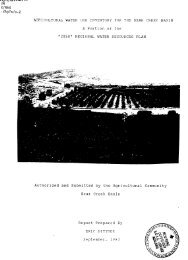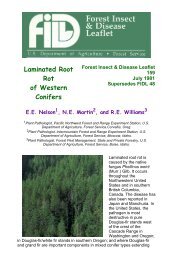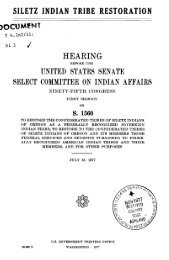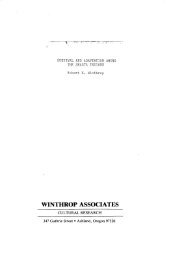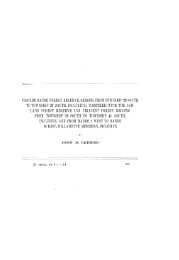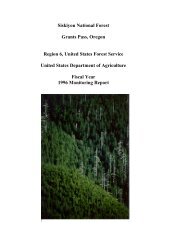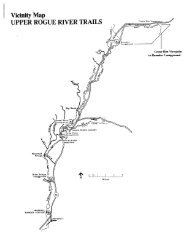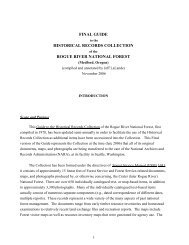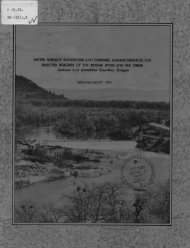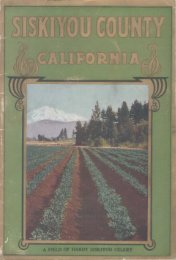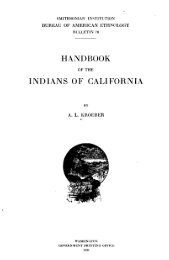Jesse Applegate; Pioneer and State Builder - Southern Oregon ...
Jesse Applegate; Pioneer and State Builder - Southern Oregon ...
Jesse Applegate; Pioneer and State Builder - Southern Oregon ...
You also want an ePaper? Increase the reach of your titles
YUMPU automatically turns print PDFs into web optimized ePapers that Google loves.
The following work was loaned through the courtesy of Jackson CountyLibrary Services to <strong>Southern</strong> <strong>Oregon</strong> University Hannon Library fordigitizing <strong>and</strong> inclusion in the <strong>Southern</strong> <strong>Oregon</strong> History Collection.You will view a digital reproduction of the material loaned by JCLS,starting with the next PDF page of this file.For more information about Jackson County Library Services or itscollection please go to the web page at http://www.jcls.org/ (homepage), or phone (541) 774-8689 (JCLS Central Library).
A -1'! A,;rnJESSE APPLEGATE<strong>Pioneer</strong> <strong>and</strong> <strong>State</strong> <strong>Builder</strong>ByJOSEPH SCHAFER, Ph. D.,Head of the Department of HistoryUniversity of <strong>Oregon</strong>ASHLAND PUBLIC LIBRARYASHLAND. OREGON 97520
"Often I have found a portrait superior in real instructionto half a dozen written 'biographies' as biographiesare written; or, rather, let me say, I have found that theportrait was as a small lighted c<strong>and</strong>le by which thebiographies could for the first time be read <strong>and</strong> some humaninterpretation be made of them."-Carlyle.
iJESSE APPLEGATEAfter a unique sketch drawn from memory by Mr. George Appflegate.The original is in the possession of Joseph Schafer at the Universityof <strong>Oregon</strong>, Eugene, <strong>Oregon</strong>.
JESSE APPLEGATE<strong>Pioneer</strong> <strong>and</strong> <strong>State</strong> <strong>Builder</strong> *<strong>Jesse</strong> <strong>Applegate</strong> could claim pioneership by the three-fold title ofinheritance, training, <strong>and</strong> lifelong habit. His father, Daniel <strong>Applegate</strong>,of English lineage, was reared in New Jersey. He entered the Revolutionaryarmy as a fifer at fifteen, <strong>and</strong> when the war closed, emigratedto the wilderness of Kentucky. There he married Rachel Lindsey, ofa distinguished pioneer family, <strong>and</strong> settled on a farm. Forty yearslater, caught up once more in the resistless "westward movement," hewas carried over into the new state of Missouri, accompanied now by alarge family. <strong>Jesse</strong> was the youngest child of Daniel <strong>and</strong> Rachel <strong>Applegate</strong>.He was born on the fifth of July, 1811, <strong>and</strong> was a lad of twelveyears when the family moved to Missouri.While Kentucky was no longer strictly a "hunter's paradise," as inthe days of Boone <strong>and</strong> Kenton, pioneer conditions had by no meansdisappeared when the <strong>Applegate</strong>s took up the line of march to a newerfrontier. Yet the boy had acquired in his early home a good elementaryeducation, so that on going to Missouri he was able, within a year orso, to fit himself for the work of a village school master. But this wasa temporary occupation, for he soon found more congenial employmentin the city of St. Louis, where he remained till 1831.The "personality" of St. Louis, during this period of her history,presents a strange jumble of more or less contradictory elements.Eastern culture was represented to some degree in commercial circles,<strong>and</strong> more largely among the professional classes, while the convergenceat that point of several great lines of wilderness activity brought prominentlyinto the foreground picturesque Rocky Mountain traders with amotley crowd of dependants, the explorers of the farther west, <strong>and</strong> themilitary guardians of an exposed frontier. These elements blended at afew points but in the main they stood apart, or jostled roughly in street,mart, <strong>and</strong> public hall.Into this environment young <strong>Applegate</strong> came with a mind dilatedto its most divergent influences. No phase of life, rude or refined, wasto him indifferent. The profane, but original <strong>and</strong> strenuous observationsof the well seasoned "river-man," <strong>and</strong> the learned disquisitions of St.Louis' greatest lawyer, alike interested him; he sought information frommen of classical training, <strong>and</strong> in libraries crowded with the works ofgreat minds, but did not fail to go, also, to the humble <strong>and</strong> the rudefellow who had had some unique experience or could furnish a desiredfactȦpplegate's strong pioneering bent is shown by the efforts he made,while at St. Louis, to gather information of every sort about the greatwestern region embracing the Rocky Mountains <strong>and</strong> the Pacific slope.Whatever he could find in print he read, but that was very little; themost important single item was the journal of Lewis <strong>and</strong> Clark, publishedin 1814. But better than the written record of their wonderfuljourney was a personal meeting he had, about 1825, with Captain Clarkhimself, then a white haired veteran who inspired him, as he longafterward confessed, with a genuine enthusiasm for pioneering.*An address delivered before the <strong>Oregon</strong> Historical Society, at the City Hall,Portl<strong>and</strong>, <strong>Oregon</strong>, Dceomber 16, 1911. The address in nearly the present form,was delivered at Astoria, <strong>Oregon</strong>. in August, 1911, before the assembled teachersof Clatsop <strong>and</strong> Columbia counties.5
Three years later, while clerking in the surveyor-general's office,<strong>Applegate</strong> gained the intimate friendship of Wilson Price Hunt, thenpost-master at St. Louis. Mr. Hunt will be remembered by all readersof Irving as Astor's agent in the dramatic commercial enterprise onwhich he sent the ship Tonquin to the Columbia in 1811. He was thefounder of Astoria, <strong>and</strong>, in a certain sense, of the trans-Rocky Mountaintrade for which that fort was the earliest emporium. Hunt talkedfreely about these romantic episodes of his younger days, stimulatedno doubt by the eager inquisitiveness of his youthful friend. In thismanner <strong>Applegate</strong> secured, from the highest living authority a graphicaccount of the first occupation of the Columbia, <strong>and</strong> this many yearsbefore the publication of Irving's Astoria.Mr. Hunt's trading habit had not yet worn off; he continued to dealin furs, using the basement of the post-office as a warehouse. "WheneverI saw the old gentleman in his shop," wrote <strong>Applegate</strong>, fifty yearslater, "I took the occasion to take a lesson in natural history, not onlyabout the wearers of the skins, but in what part of the earth the livinganimal was to be found."<strong>Applegate</strong> boarded at the old Green Tree Tavern, an unpretentioushostelry which commonly served as the winter rendezvous of the RockyMountain Fur Company. There the partners, Jedediah Smith, DavidJackson <strong>and</strong> Wm. L. Sublette would meet, in their leisure time, to settlethe season's accounts <strong>and</strong> plan the operations of the following year.Each of the three had spent many years in the heart of the Rockies.They knew to a nicety the resources of furs represented by the mountainstreams; they were familiar with the native tribes of the region,with its geography, <strong>and</strong>, in a crude way, its natural history. Besides,the vast spaces beyond the Rockies were to them by no means a sealedbook. Jedediah Smith had explored for his company an overl<strong>and</strong> routefrom Salt Lake to <strong>Southern</strong> California; he had traversed the entirelength of that then mysterious Mexican province, had forced a waynorthward to Fort Vancouver on the Columbia, where he spent thewinter of 1828-29 as the guest of Doctor John McLoughlin, <strong>and</strong> hadmade himself conversant with the fur trade as conducted by the Hudson'sBay Company in <strong>Oregon</strong> under McLoughlin's skillful supervision. Hetherefore brought to St. Louis, when he next met his partners at theGreen Tree Tavern, the freshest <strong>and</strong> most complete report obtainableon conditions all along the coast, from San Diego to Vancouver <strong>and</strong>inl<strong>and</strong> from the Rio Colorado to Couer d'Alene Lake. And what taleshe could tell of daring <strong>and</strong> dangerous exploits in the wilderness-of hishair breadth escape from the Mojave Indians, his brush with someMexican officials in California, the massacre of his party <strong>and</strong> plunderingof his furs <strong>and</strong> goods by the savages on the Umpqua. These, <strong>and</strong>many other incidents of his adventurous journeys, must have made themeeting at the Green Tree Tavern in the winter of 1829-30 an eventmemorable even in the annals of the far west fur trade. Little wonderthat a high spirited, adventurous youth like <strong>Applegate</strong> should improvethe opportunity of a fellow guest to ingratiate himself with these menin order to lose no item of their exciting discourse. "I was then h<strong>and</strong>ywith the pen," he writes, "<strong>and</strong> h<strong>and</strong>ier still with figures, <strong>and</strong> volunteeredmy services to these mountain heroes, my sole reward being to hearthem recount their adventures."Almost these veterans of the inl<strong>and</strong> trade, with its glamour ofromance <strong>and</strong> allurement of riches, had won in <strong>Applegate</strong> a convert totheir wild, irregular mode of life. But the appeal of his kind, wisemaster, Colonel McKee, was even stronger than theirs, <strong>and</strong> our youngpioneer was saved for other pioneering labors that should yield noblerfruits to society if smaller gains to himself.This Colonel McKee appears to have been a large factor in <strong>Jesse</strong><strong>Applegate</strong>'s intellectual training, a process that was going forward6
simultaneously with his preparation for the higher forms of pioneering.He is described by <strong>Applegate</strong> as a man of "vast <strong>and</strong> varied information"<strong>and</strong> of a fatherly disposition. Having the young man constantly at hiselbow, in the office during the day <strong>and</strong> the private study evenings, <strong>and</strong>talking incessantly <strong>and</strong> well upon all manner of subjects, the effect wasto impart to him the semblance of a liberal education.Another man who, during the St. Louis period, exerted a profoundinfluence on <strong>Applegate</strong>'s mind, was the distinguished lawyer, EdwardBates, later a member of Lincoln's first cabinet. Edward Bates wasa Virginia gentleman of the old school, with all the dignity <strong>and</strong> aplomb,the culture, the delicate sense of honor that the phrase implies. He wasnot only a great lawyer, but a student of social problems as well, withpositive views on government <strong>and</strong> an active interest in public affairs.Politically he was an extreme conservative, reflecting to the end of hiscareer, the federalistic tendencies of Washington's time. Thanks, probably,to his Quaker connection he was a pronounced opponent of slavery.We do not know the precise relationship subsisting between them, butwe know that Bates was always revered by <strong>Applegate</strong> as benefactor<strong>and</strong> friend. There is a tradition that he assisted the boy to improvehis education, also that he took him into his office for a time as clerk;at all events, the association between them was exceedingly close, <strong>and</strong>left an abiding record in the character of the younger man. It seemsme that this association helps to explain <strong>Applegate</strong>'s clear, strongviews on government, as he afterward impressed them, through numerouschannels, upon the <strong>Oregon</strong> people; it may have contributed todevelop in him the passion for order, <strong>and</strong> the punctilious regard he evershowed for forms <strong>and</strong> precedents in legislative matters. His militantnationalism <strong>and</strong> his abhorrence of slavery are explicable on othergrounds, but to both traits the great lawyer's influence lent positivesupport.Bates <strong>and</strong> <strong>Applegate</strong>, while differing much in mental gifts-theyounger man being more brilliant <strong>and</strong> original than the elder-wereso congenial that the friendship formed in this unequal manner grewstronger with the passing years <strong>and</strong> endured through life. It is saidthat even while under the enormous strain of his cabinet duties, duringthe war, Bates yearly wrote one or more long letters to <strong>Applegate</strong>, <strong>and</strong>those familiar with the latter's epistolary habit are well convinced thatno letter failed of a response. This was one of the ways in which the"rancher" of the <strong>Oregon</strong> frontier kept himself in touch with nationalpolitics.The St. Louis period, extending from about 1825 to 1831, or fromhis fourteenth to his twentieth year, is manifestly the time in whichyoung <strong>Applegate</strong> was being specially schooled for his later career. Itwas then that his youthful fancy, rioting in tales of far west adventure,began to form those bold designs of pioneering that foreshadow the distinctivework of his life. And it was during the same period that helaid the foundations for a broad <strong>and</strong> accurate though general knowledgeof literature, history, <strong>and</strong> science which marked him out later as oneof the best read men on the Pacific Coast. He gained, also, some familiaritywith Latin, became highly proficient in a limited range of mathematicalsubjects, <strong>and</strong> in some way developed a literary style which wassingularly pure <strong>and</strong> graceful as well as verile <strong>and</strong> dignified. Heacquired in addition at least the fundamentals of both law <strong>and</strong> engineering,each of which proved of distinct service to the new community hewas to help build beyond the mountains.<strong>Applegate</strong>'s proficiency as a surveyor obtained for him, at the ageof about nineteen, a deputyship in the office of surveyor-general. Thereaftermuch of his time was spent in field work, especially in the southwesternportion of the state. Marrying in the spring of 1831, he bought7
a fine tract of l<strong>and</strong> in the Osage Valley <strong>and</strong> made his home there asa farmer <strong>and</strong> stock raiser for twelve years, but he continued to act asdeputy-surveyor also during the greater part if not the whole of thattime. In 1843 he carried his trusty compass to the western shore ofthe continent <strong>and</strong> at once resumed its use in a significant service coveringalmost forty years.The interest in <strong>Oregon</strong> had widened <strong>and</strong> intensified since <strong>Applegate</strong>first met the mountain traders at the Green Tree Tavern, <strong>and</strong> sourcesof information about the country had multiplied. <strong>Oregon</strong> was no longer,as it once had been, the object of desire to exploiters of furs only, butwas coming to be regarded as a practicable field of operations for agriculturalpioneers. The forerunners of that class, like the "long hunters"of Kentucky seventy-five years earlier, had reported the l<strong>and</strong> both"pleasant <strong>and</strong> goodly." It was far away <strong>and</strong> difficult of access, butstill, to men of their stamp, not unattainable. Several American missionaries,both men <strong>and</strong> women, had gone to <strong>Oregon</strong> overl<strong>and</strong> in theprevious decade, <strong>and</strong> continued to reside there, sustained by the friendlysupport of the Hudson's Bay Company. The mission stations weregradually assuming the appearance of settlements, especially in theWillamette Valley, whose soil <strong>and</strong> climate, <strong>and</strong> flattering commercialoutlook had attracted a small group of American adventurers, <strong>and</strong> wherethe discharged operatives of the fur company were beginning to makehomes. Irving, Parker, <strong>and</strong> Wyeth had written books about <strong>Oregon</strong>,<strong>and</strong> many letters, from missionaries <strong>and</strong> others living beyond the mountains,were finding their way into the public prints. Congress discussedplans to promote the settlement of the country, spreading far <strong>and</strong> wideprinted reports embodying information about it; the department ofstate was trying to terminate the <strong>Oregon</strong> dispute with Great Britain,<strong>and</strong> the war department moved for the exploration of a road to theColumbia in order to facilitate emigration thither; something had alreadybeen done to establish proper relations with the <strong>Oregon</strong> tribes of Indiansthrough the sending of an Indian sub-agent in 1842.The government, however, was in general too slow for the pioneers.Before congress could pass a law to encourage settlers, before Webster<strong>and</strong> his successors in office could negotiate a treaty, before the warsecretaries could accomplish the design of opening a road, the frontiersmenthemselves, under leaders of their own choosing <strong>and</strong> hence of theirown type, had rendered the contemplated governmental action if notsuperfluous at least less urgent. They had opened a road all the wayto the Columbia, had occupied, in an orderly manner, for agriculturalpurposes, much of the best l<strong>and</strong> in Western <strong>Oregon</strong>, <strong>and</strong> without charter,law, or other authorization beyond the treaty of joint-occupation whichmerely gave them a right to be in the country, they had organized onthe shores of the Pacific a true American government, the first of itskind in that portion of the world.In all of the momentous activities here outlined, <strong>Jesse</strong> <strong>Applegate</strong>was a prime leader. He, like many others of his time <strong>and</strong> section, hadbecome discouraged at the long duration of the "hard times," whichpressed heavily upon those frontier settlers living away from navigablestreams, then almost the sole means of transportation for the countrywest of the Mississippi. Besides, the progress of slavery was rapid inMissouri. <strong>Applegate</strong>, who would not own negroes, was forced to hiretheir labor from neighboring owners in order to be able to cultivate hisfields. He felt keenly the social as well as the economic evils of theslave system, <strong>and</strong> was constrained to remove his young family beyondits influence. He had kept up with the new information regarding <strong>Oregon</strong>,<strong>and</strong> was in personal correspondence with a friend who lived there.<strong>Applegate</strong> had long known, what others were just learning, that Western<strong>Oregon</strong> was a paradise for the stock raiser. So, after mature delibera-8
tion, he decided to transfer his Osage Valley herd, which was all butvalueless from the prevailing depression, to the virgin meadows of theWillamette, two thous<strong>and</strong> miles away.The story of the great immigration to <strong>Oregon</strong> in 1843 has been frequentlytold, sometimes with embellishments that sadly mar the truthof history. It should be remarked that the movement was a perfectlynatural expression of the pioneering genius of our people, <strong>and</strong> not, asoften misrepresented, an outburst of Quixotic' patriotism. The emigratingcompany of nearly one thous<strong>and</strong> persons was recruited by no oneman; it gathered almost spontaneously, in response to feelings <strong>and</strong>motives that were widespread along the border, <strong>and</strong> that came to fruitionin a variety of ways-sometimes through public discussion, oftener inthe neighborly chat or the fireside conference. Personal influence wasfelt in this as in every large human event. Emigrating parties wereorganized in different localities, <strong>and</strong> the accession anywhere of an ableor a prominent man was the signal for others less independent to givein their names. The decision of <strong>Jesse</strong> <strong>Applegate</strong> to go to <strong>Oregon</strong> probablycaused a number of others in St. Clair County, Missouri, to dolikewise, among them his two elder brothers, Charles <strong>and</strong> Lindsey.The several companies from Missouri <strong>and</strong> other western states metnear Independence, Missouri, in April, 1843, prepared for the long overl<strong>and</strong>march. <strong>Applegate</strong>'s outfit is said to have consisted of about onehundred head of livestock, <strong>and</strong> four wagons, "loaded * * with flour,bacon, <strong>and</strong> such fruits <strong>and</strong> vegetables as were fit for transportation;tools of all kinds; household goods <strong>and</strong> wearing apparel; a few valuablebooks, among them the school books of his children, some historicalworks, a Worcester's dictionary, a copy of Shakespeare, the Bible he hadcarried on his surveying trips, his mathematical works, * *" Theemigrants organized for the journey with Peter H. Burnett as captain,intending at first to travel as a single great company. But at theKansas River trouble arose over the question of caring for the loosestock, those having no cattle objecting with some justice to the performanceof guard duty. Burnett now resigned <strong>and</strong> a reorganizationtook place, those without the incumbrance of cattle forming the lightcolumn, the others the so-called "cow-column." Of the latter company<strong>Jesse</strong> <strong>Applegate</strong> was chosen captain.It is a trite but true remark among far west pioneers that no severertest of a man's fitness for leadership was ever devised than the captaincyof an <strong>Oregon</strong> or California emigrating company; <strong>and</strong> it is the universaltestimony of the 1843 immigrants that <strong>Applegate</strong> more than met therequirements of this exacting office. By his accurate knowledge of thedifficulties to be encountered, his resourcefulness in overcoming them,his tact <strong>and</strong> courage, his comm<strong>and</strong>ing personality, <strong>and</strong> withal the kind,helpful spirit he always manifested, he not only held the uniform respectof all these staunch frontiersmen but won their loyal affection. Hischarming essay, "A Day with the Cow Column," descriptive of the movementof his company across the plains, is a classic in the literature ofwestern adventure.From Fort Hall westward, the region through which a road had yetto be found, <strong>Applegate</strong> is said to have been in advance, with his compass,to determine at critical points the route to be taken. In this hewas greatly aided by Doctor Marcus Whitman, whose general knowledgeof the country enabled him to make valuable suggestions. While thecompany was descending the Columbia with rafts, from Fort WallaWalla, an accident occurred by which three persons were drowned; oneof them was <strong>Jesse</strong> <strong>Applegate</strong>'s eldest son, a bright studious boy ofeleven summers, named, for his friend <strong>and</strong> patron, Edward Bates.9
<strong>Applegate</strong> selected a piece of l<strong>and</strong> within the present limits of PolkCounty, where he remained till the year 1849. He followed farming tosome extent, raised a fine herd of cattle, built a small grist mill, <strong>and</strong>worked much at his profession of surveying, laying off the settler'sclaims, marking ctut roads, etc. The legislature of 1844 appointed himsurveyor-general of the colony, with the special duty of investigatingcertain canal projects. He was a man of great activity, industry, <strong>and</strong>skill, accomplishing with apparent ease seemingly difficult undertakings,<strong>and</strong> with the disposition to multiply interests in such a way as to keephimself more than fully occupied. There was no busier man in thelittle colony.<strong>Applegate</strong> often averred that he had in this period no time forpolitics, the care of a growing <strong>and</strong> still helpless family absorbing allhis energies. But his sense of duty impelled him, in the summer of1845, to devote not only his time but his best talents to the public servicein the hope of improving the political condition of the people.Government in <strong>Oregon</strong> had thus far been in process of painful evolution.The Hudson's Bay Company's officers had exercised a civil jurisdictionadequate to the needs of an unsettled country harboring a fewtraders. But when Americans began to collect in numbers around theMethodist mission a dem<strong>and</strong> soon arose for some sort of American government.Inasmuch as the United <strong>State</strong>s was merely a claimant to thecountry, not its sovereign, congress felt unable to afford relief but leftthe people of <strong>Oregon</strong> to create for themselves such political institutionsas were deemed necessary.A preliminary step was taken in 1841, when, to meet a sudden emergencya probate judge was elected by the people. This seemed at thetime to be all the "government" needed. The first formal organization,in May, 1843, was probably premature. For practically one-half of thesettlers voted it to be unnecessary, <strong>and</strong> the Hudson's Bay Companywere prepared, for national reasons, to place obstacles in the way ofits successful working which there was not strength enough in theAmerican portion of the community to overcome.The organization itself was faulty. There was a body of "organiclaws," somewhat loosely drawn, which had been adopted by popular vote.It professed to create a provisional government for <strong>Oregon</strong> until suchtime as the United <strong>State</strong>s should take the country under its jurisdiction.The frame of government embraced an executive committee of three,a legislative committee of nine, <strong>and</strong> several justices, constables, asheriff, recorder, etc. To support this somewhat pretentious systemresort was had to the fatuous expedient of a popular subscription. Theexecutive committee was as ineffectual as such committees usually are,<strong>and</strong> the judiciary was peculiarly ill adapted to its work. Moreover,the Methodist mission, whose agents had engineered the provisionalgovernment movement, granted to itself an entire township of l<strong>and</strong>,giving a like amount to the Catholic mission, a move which many feltwas wholly political <strong>and</strong> which engendered much opposition.When the great body of new immigrants arrived in the followingwinter, the effect was to subordinate the missionary party, as well asthe fur company. In the next election the pioneers secured controlof affairs <strong>and</strong> proceeded at once, by their legislative committee, toreorganize the government. The three headed executive was abolished<strong>and</strong> a "governor" substituted, a legislature of thirteen members wascreated, <strong>and</strong> the judiciary was reformed. The committee also struck ablow at' their missionary predecessors by restoring to individual entrythe two townships of l<strong>and</strong> appropriated by the two missions. Finally,they adopted a simple but effective method of raising money by virtualtaxation.While the character of this legislation was undeniably wholesome, the10
committee showed a surprising lack of orderliness <strong>and</strong> foresight in themode of its enactment. They practically ignored the existence of aconstitution, treating the organic laws adopted by the people the yearbefore as mere statutes, subject to unlimited amendment or to abolitionby a body which, though actually deriving its existence from them,assumed thus to st<strong>and</strong> outside of <strong>and</strong> above the laws. Nor did the committeesubmit their acts to the people, who alone had the power tolegitimize them, but on their own motion declared them to be in effectthroughout that part of <strong>Oregon</strong> south of the Columbia. Since theorganic laws had applied to the whole of <strong>Oregon</strong>, it could be plausiblycharged against the committee that in addition to their other high h<strong>and</strong>edacts, they had also sought to limit the American territorial claims.Testimony varies as to the effect of this revolution upon the country.Perhaps the danger of "anarchy <strong>and</strong> internicene war" was not so imminentas <strong>Applegate</strong> at a later time supposed it to have been, yet, betweenthe positive <strong>and</strong> the negative acts of the committee, many thoughtfulpersons felt that the people had been greviously wronged. The upshotof the agitation was another reorganization which brought order <strong>and</strong>political prosperity to the distracted colony. In this final readjustmentthe guiding h<strong>and</strong> was that of <strong>Jesse</strong> <strong>Applegate</strong>.<strong>Applegate</strong> allowed himself to be chosen, by the people of Yamhill, amember of the legislature of 1845. He entered the session with acomplete program of reform which he was able to carry out to the letter."My intention was," he wrote at a later time, "to reassert the right of theUnited <strong>State</strong>s to the whole of <strong>Oregon</strong>, which the legislature of 1844 hadlimited to the south bank of the Columbia-<strong>and</strong> to secure the peace ofthe country by binding the whole white population in a compact to maintainit."His point of departure was the organic laws of 1843. These he revised<strong>and</strong> improved, producing a document which in form <strong>and</strong> substancewas a true constitution. He then asked the people to choose betweenthe old organic laws <strong>and</strong> the new, copies of both, written laboriouslyby h<strong>and</strong>, being read to them at the polling places. By an overwhelmingmajority they chose the revision, thereby indicating complete satisfactionwith the legislature's work. A new lease of power was also votedto the officers chosen in June.<strong>Applegate</strong>'s program having triumphed so signally among the Americanssouth of the Columbia, he proceeded to the more delicate taskof securing for it the endorsement of the British residents north ofthe river. For this purpose he became the diplomatic agent of the<strong>Oregon</strong> government to negotiate an arrangement with McLoughlin ofthe Hudson's Bay Company. McLoughlin at first repelled the idea ofBritish subjects becoming parties to an American government; but<strong>Applegate</strong> had prepared the way for union so skillfully, he urged hisreasons with such convincing force, <strong>and</strong> was so fair in his treatment ofthe company's interests, his personality comm<strong>and</strong>ed such unlimited respect,that gradually every obstacle was removed. The officers of the companyformally gave in their adherence to the provisional government,agreeing to accept its jurisdiction, to pay certain taxes for its support,<strong>and</strong> in all respects to abide by its laws. This brought to an end the dualjurisdiction which had subsisted for several years, <strong>and</strong> incidentallydemonstrated to the world that the much mooted occupation of <strong>Oregon</strong>by Americans was a fact accomplished. The effect upon the Britishgovernment may be inferred from the words of one of its special agents,Lieut. Henry Warre, who had been sent to report on conditions in <strong>Oregon</strong><strong>and</strong> who reached Fort Vancouver a few days after this diplomaticepisode was closed. "The Hudson's Bay Company," he wrote, "were socompletely overruled by the number of Americans that they were obligedto join in this compact which neutralized their authority in thecountry *11
<strong>Applegate</strong>'s significant work of reorganization was now completed,<strong>and</strong> the government he put in operation remained in force till March,1849, when <strong>Oregon</strong> was proclaimed a territory of the United <strong>State</strong>s.In all that time it comm<strong>and</strong>ed universal respect, secured equal justice,<strong>and</strong> promoted the prosperity of the colony. The people had gained fullcontrol of affairs, <strong>and</strong> special interests had to comply with laws passedfor the general good. "Both the Methodist mission <strong>and</strong> the Hudson'sBay Company ceased to be political powers either to be feared or courtedin the colony, <strong>and</strong> to the end of its existence the Provisional governmentof <strong>Oregon</strong> attained all the ends of good government."The verdict of history on the <strong>Oregon</strong> provisional government, isidentical with the judgment expressed by <strong>Applegate</strong> himself in thewords just quoted. Yet, so imperfectly has the work of 1845 beendifferentiated, in the popular mind, from earlier <strong>and</strong> tentative essays atpolitical organization, that <strong>Applegate</strong>'s right to be honored as the truefounder of <strong>Oregon</strong>'s pioneer government is, by the present generation,commonly ignored.In the beginning it was not so. <strong>Oregon</strong>ians of that day gladlyacknowledged him as the sage <strong>and</strong> law-giver of the colony, while Britishvisitors to the Northwest coast instinctively recognized his leadership.Lieutenant Warre <strong>and</strong> his associate, Lieutenant Vavasour, paid theirrespects to this extraordinary American frontiersman; <strong>and</strong> LieutenantPeel, son of the then premier of Great Britain, visited him at his farm,enjoyed the simple bounties of his table, <strong>and</strong> discoursed with him concerningthe qualities of the men who would cross a continent in orderto make homes in the <strong>Oregon</strong> wilderness. Dr. McLoughlin's letters tothe Hudson's Bay Company in London afford a complete proof of<strong>Applegate</strong>'s superior agency in securing the company's adherence tothe provisional government.The record of the sessions of 1845 is preserved, with those of earlier<strong>and</strong> later proceedings, in the manuscript archives relative to the provisionalgovernment. To the student who will scan patiently the documentsin that mass of unarranged material-reading over resolutions,laws, memorials to congress, <strong>and</strong> constitutions-so many of which arein <strong>Applegate</strong>'s h<strong>and</strong>writing, his legislative pre-eminence in this age ofbeginnings will st<strong>and</strong> revealed. Such a study cannot fail to engender afeeling of profound respect for the pioneer statesmana who, under the conditions,was able to lay such true foundations for America's first commonwealthon the Pacific Coast.<strong>Applegate</strong>'s later career was almost wholly that of a private citizen.In 1857 he represented his <strong>Southern</strong> <strong>Oregon</strong> constituency in the conventionwhich framed the <strong>State</strong> constitution but, owing to a seriousobjection to the policies of those who controlled that body, he refusedto remain till the convention completed its labors. For this he hasbeen much criticised. The incident seems to illustrate some of hisshortcomings as a public man-he lacked that sense of humor whichcharacterizes the "good loser" <strong>and</strong> he had an almost Jacksonian disinclinationto follow another's lead.After the beginning of the gold rush to California <strong>Applegate</strong>, in1849, had removed his family to the Umpqua Valley <strong>and</strong> settled at aplace which he named Yoncalla on the <strong>Oregon</strong>-California trail. There,under the shadow of the mountains, he tilled his fields <strong>and</strong> cared forextensive herds of cattle reared for the California market. There hebuilt his great house, a kind of latter-day Shirley or Westover, wherefor many years he dispensed a generous <strong>and</strong> equal hospitality to visitorsof all grades of social merit. Today it might be a rude woodsmanwanting fodder for his cattle, shelter <strong>and</strong> food for himself; tomorrowa polished jurist or publicist eager for the sage discourse for which thehost was famed. Occasionally he entertained men of national distinction,12
as in the fall of 1865 when Schuyler Colfax <strong>and</strong> Samuel Bowles alightedone morning from the California stage to breakfast with him.From his frontier retreat at Yoncalla <strong>Jesse</strong> <strong>Applegate</strong> looked outupon the world of politics with the pathetic interest of one whom naturehas designed for leadership <strong>and</strong> fate condemned to a humdrum existence.Not being in a position to direct public affairs, he scrutinized sharply theconduct of those who were, <strong>and</strong> always assumed a direct personalresponsibility for the doings of those he had helped to place in office.His opinions on public questions, always luminous <strong>and</strong> finely wrought,if sometimes suggestive of the closet rather than the council, wereimpressed upon his fellows through hundreds of letters to friends orpublic men, through political platforms, legislative bills <strong>and</strong> newspaperarticles. The investigator rarely finds in the spontaneous written utterancesof public men such vitality of thought or such blended vigor <strong>and</strong>felicity of expression as are to be met with in the everyday familiarletters of this extraordinary pioneer. They reveal a character not unmarredwith idiosyncrasies, not free from pecadilloes or even seriousfaults, yet upright <strong>and</strong> generous, with broad sympathies <strong>and</strong> a sensitiveregard for social justice. He was an unselfish, sacrificing, public spiritedcitizen.<strong>Applegate</strong> was a member of the government commission appointed tosettle the treaty claims of the Hudson's Bay Company <strong>and</strong> the affiliatedPuget Sound Agricultural Company. In this connection he prepared avoluminous report which is in the nature of a closely reasoned legalbrief. It illustrates his justice to opponents, his scrupulous regard forthe public welfare, <strong>and</strong> his extraordinary grasp of the principles ofequity which the case involved. He always flattered himself that throughthis report he had saved the American government a large sum ofmoney.In 1865 <strong>Applegate</strong> wrote at the request of Schuyler Colfax a seriesof letters on the then paramount problem of reconstruction. They wereprinted in the <strong>Oregon</strong> <strong>State</strong> Journal, published at Eugene, <strong>and</strong> also sentto Mr. Colfax. These letters, constituting a treatise, are cast in a pleasingliterary mold, <strong>and</strong>, although somewhat disappointing from theirimpracticable recommendations <strong>and</strong> their innocence of research, theywill not fail to charm the reader who appreciates original thinkingon political questions or a unique restatement of time-worn principles.His views on the race question, on negro enfranchisement, <strong>and</strong> the generaldiffusion of political power are highly suggestive. His theory that theright of suffrage should be regulated by the nation on a uniform basiswas logically consistent but it was destined to make little impressionupon the reconstruction committee of congress.Samuel Bowles, who possibly as an eastern man was unpreparedfor such a phenomenon, marvelled to find a political sage in the Umpquaforests <strong>and</strong> wrote it as his opinion that the people of <strong>Oregon</strong> ought tosend <strong>Jesse</strong> <strong>Applegate</strong> to the United <strong>State</strong>s Senate. <strong>Applegate</strong>, however,had none of the politician's arts <strong>and</strong> his frontier individualism was ofthat militant cast which rather repelled than encouraged the assistanceof friends who sought his elevation to high office. Once, it is said,he could have had a senatorship at the behest of the reigning "boss"<strong>and</strong> in declining to receive it on such terms he honored his manhoodmore than any office could honor it.<strong>Jesse</strong> <strong>Applegate</strong> died in 1888, having suffered during life's finalspan crushing reverses <strong>and</strong> bitter sorrows. His bones rest under a lonefir tree on a gentle slope of Mt. Yoncalla, a plain slab of native s<strong>and</strong>stonemarking the grave. The lusty commonwealth nurtured to vigorby his fostering h<strong>and</strong> would honor itself <strong>and</strong> win the blessing of reverencewell bestowed by erecting on that spot or elsewhere a suitablememorial to this prince among <strong>Oregon</strong> pioneers.-JOSEPH SCHAFER.13



